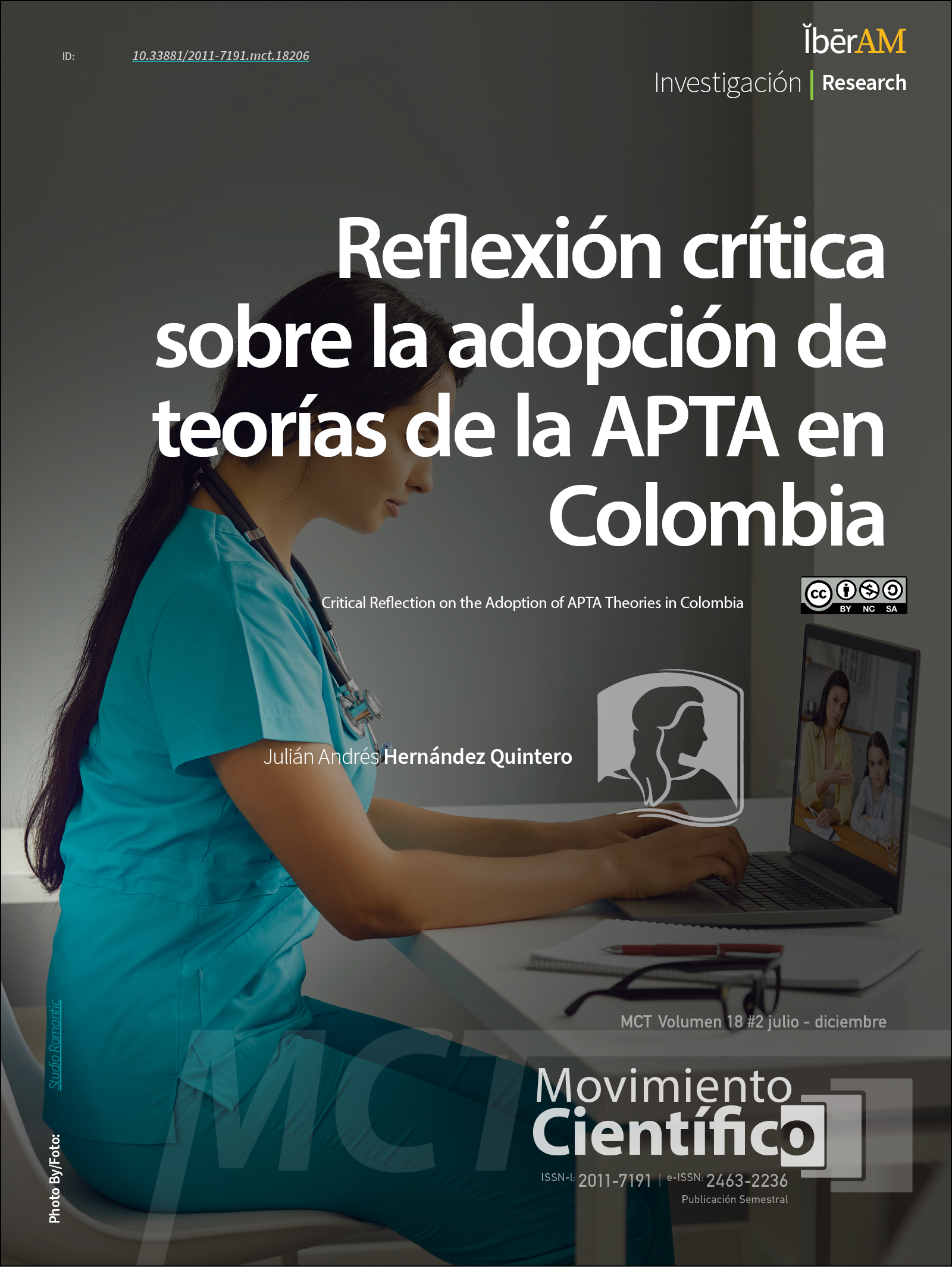Critical reflection on the adoption of APTA theories in Colombia
Reflexión crítica sobre la adopción de teorías de la APTA en Colombia
Main Article Content
This study examines the relevance of adopting the theories of the American Physical Therapy Association (APTA) in Colombia, considering the differences in the socioeconomic and health contexts between the two countries. Through a systematic literature review, 20 articles were analyzed that explore the influence of the APTA and the particularities of the Colombian health system. The results reveal that APTA theories, designed for a highly technological environment, do not always fit the conditions in Colombia, where resource distribution is unequal and access to advanced technologies is limited. The study emphasizes the need to develop local theories in Colombia to ensure a more effective and contextualized physical therapy practice, avoiding intellectual dependency and promoting local innovation. Finally, it concludes that the creation of a theoretical framework based on local research is essential for an autonomous, relevant, and sustainable physical therapy in the Colombian context.
Downloads
Publication Facts
Reviewer profiles N/A
Author statements
Indexed in
-
—
- Academic society
- N/A
- Publisher
- Bogotá: Corporación Universitaria Iberoamericana
Article Details
Audette, J. (2017). Trends in global health: Improving health equity through physical therapy and rehabilitation. Health Volunteers Overseas. Retrieved from https://hvousa.org/what-we-do/publications/trends-in-global-health-improving-health-equity-through-physical-therapy-and-rehabilitation
Brennan, G., & Fritz, J. M. (2016). Examining the evidence for value-based physical therapy: Is it time to adopt a new health services research agenda? Physical Therapy, 96(7), 1020-1024. https://doi.org/10.2522/ptj.20150413
Crump, J. A., & Sugarman, J. (2021). Ethical considerations for physical therapists practicing outside their scope in low- and middle-income countries. Journal of Bioethical Inquiry, 18(3), 300-315. https://doi.org/10.1007/s11673-021-10004-z
Dean, E. (2011). Adopting population health frameworks in physical therapist practice research and education: The urgency of now. Physical Therapy, 101(10), pzab158. https://doi.org/10.1093/ptj/pzab158
Dholakia, K., & Willgens, A. (2021). Uncovering ethical dilemmas in international service-learning: A grounded theory. Journal of Physical Therapy Education, 35(2), 128–137. https://doi.org/10.1097/JTE.0000000000000182 DOI: https://doi.org/10.1097/JTE.0000000000000179
Freburger, J. K., Holmes, G. M., & Carey, T. S. (2011). Comparing patient characteristics and treatment processes in patients receiving physical therapy in the United States, Israel, and the Netherlands: Cross-sectional analyses of data from three clinical databases. BMC Health Services Research, 11(76), 1-9. https://doi.org/10.1186/1472-6963-11-76 DOI: https://doi.org/10.1186/1472-6963-11-76
Glickman, L., Olsen, J., & Rowthorn, V. (2015). Measuring the cross-cultural adaptability of a graduate student team from a global immersion experience. Journal of Cultural Diversity, 22(4), 148. DOI: https://doi.org/10.1016/j.physio.2015.03.3241
Greenfield, B., & Jensen, G. M. (2021). Theory-Informed Clinical Practice: How Physical Therapists Can Use Theoretical Frameworks to Guide Clinical Decision Making. Physical Therapy, 101(10), pzab158. https://doi.org/10.1093/ptj/pzab158 DOI: https://doi.org/10.1093/ptj/pzab158
Jones, M. A., & Dean, E. (2011). A vision for society: Physical therapy as partners in the national health service delivery system. Physical Therapy, 91(11), 1664-1674. https://doi.org/10.2522/ptj.20110148 DOI: https://doi.org/10.2522/ptj.20100347
Kumar, S. (2021). Navigating Citizenship in the Harbour City: Sexuality, ethnicity and belonging among Lebanese, Indian, and Anglo LGBTQ+ young adults in Sydney, Australia (Doctoral dissertation, UNSW Sydney).
Leigh, J. P., & To, T. (2012). Advancing physical therapy practice to improve global health: Perspectives from low- and middle-income countries. Physical Therapy, 92(12), 1625-1634. https://doi.org/10.2522/ptj.20120079 DOI: https://doi.org/10.2522/ptj.20120079
Lin, C.-L., Ye, Y., & Lin, P. (2021). Safe sexual behavior intentions among college students: The construction of an extended theory of planned behavior. International Journal of Environmental Research and Public Health, 18(5), 6349. https://doi.org/10.3390/ijerph18056349 DOI: https://doi.org/10.3390/ijerph18126349
Nicolini, D. (2012). Practice theory, work, and organization: An introduction. Oxford University Press.
Noor, M. N., Holt, M., & Qureshi, A. (2021). Sexual risk-taking among homeless young people in Pakistan. Health and Social Care in the Community, 29(5), 1550-1558. https://doi.org/10.1111/hsc.13169 DOI: https://doi.org/10.1111/hsc.13220
Schreiber, J., Goodgold, S., Moerchen, V., & Bennett, S. (2013). Defining, agreeing on, and testing an international physical therapy core data set: Results of a feasibility study involving seven countries. Physical Therapy, 93(4), 449-462. https://doi.org/10.2522/ptj.20120238
SpringerLink. (2021). Theories of practice and global public health. In Promoting physical therapists’ integration of research evidence to inform clinical practice: A global perspective (pp. 16-39). Springer. https://doi.org/10.1007/978-3-030-62815-3_16
Van der Zee, J., Baart de la Faille-Deutekom, M., & Post, M. W. (2014). The influence of health system context on outcomes of physical therapy: A cross-sectional comparison between the United States, Israel, and the Netherlands. BMC Health Services Research, 14(103), 1-9. https://doi.org/10.1186/1472-6963-14-103 DOI: https://doi.org/10.1186/1472-6963-14-103
World Physiotherapy. (2018). Profile of the profession: Global snapshot of physical therapy practice. World Physiotherapy. Retrieved from https://world.physio/resources
World Physiotherapy. (2019). Survey reveals global state of the physical therapy profession. World Physiotherapy. Retrieved from https://world.physio/resources















